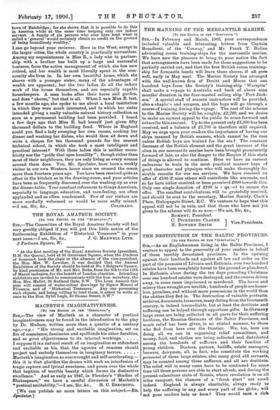MACBETH'S IMAGINATIVENESS.
pro TICE EDITOTS OF THE "SrzerAxort.') SIR,—The view of Macbeth as a character of poetical imaginativeness may be found in the introduction to the play by Dr. Hudson, written more than a quarter of a century ago,—e.g. "His strong and excitable imagination, set on fire of conscience, fascinates and spellbinds his other faculties,
and so gives objectiveness to its internal workings I suppose it is a natural result of an imagination so redundant and excitable as his, that the agonies of remorse should project and embody themselves in imaginary terrors Macbeth's imagination so overwrought and self-accelerating,- this it is that glorifies the drama with such an interfusion of tragic rapture and lyrical sweetness, and pours over the whole that baptism of "terrible beauty which forms its distinctive excellence." And its early as 1847, in Fletcher's "Studies of Shakespeare," we have a careful discussion of Macbeth's "poetical excitability."—I am, Sir, &c., H. C. BEECHING.
[We can publish no more letters on this subject.—En. , Spectator.]










































 Previous page
Previous page